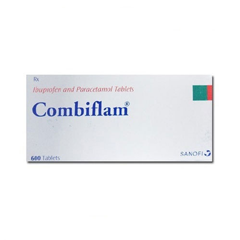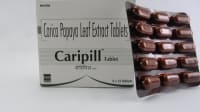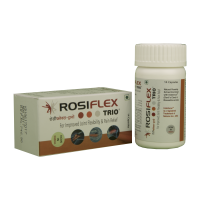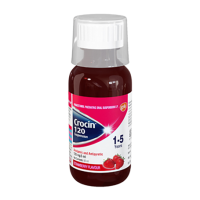
NOTICE: unsafe with : Alcohol
USED FOR:
Pain relief
Fever
COMPOSITION:
Ibuprofen (400mg)
Paracetamol (325mg)
Therapeutic Uses:
pain analgesics

CAUTION
Taking Ibuprofen+Paracetamol with alcohol can cause liver damage.

WEIGH RISKS VS BENEFITS
Combiflam Tablet may be unsafe to use during pregnancy.Animal studies have shown adverse effects on the foetus, however, there are limited human studies. The benefits from use in pregnant women may be acceptable despite the risk. Please consult your doctor.

SAFE
Combiflam Tablet is safe to use during lactation. Human studies have shown that either the drug does not pass into the breastmilk in significant amount or is not expected to cause toxicity to the baby.

SAFE
Combiflam Tablet does not usually affect your ability to drive.

CAUTION
Combiflam Tablet should be used with caution in patients with kidney disease. Dose adjustment of Combiflam Tablet may be needed. Please consult your doctor.Use of Combiflam Tablet is not recommended in patients with severe kidney disease. Long term use of this medicine can affect the kidney function.

CAUTION
Combiflam Tablet should be used with caution in patients with liver disease. Dose adjustment of Combiflam Tablet may be needed. Please consult your doctor.However, the use of Combiflam Tablet is not recommended in patients with severe liver disease and active liver disease.
Uses of Ibuprofen
Ibuprofen is used for pain relief and fever.It relieves pain and inflammation in conditions like headache, muscle pain, dental pain or joint pain.
How to use Ibuprofen
Take this medicine in the dose and duration as advised by your doctor. Swallow it as a whole. Do not chew, crush or break it. Combiflam Tablet is to be taken with food.
How Combiflam Tablet works
Ibuprofen is a non-steroidal anti-inflammatory drug (NSAID). It works by blocking the release of certain chemical messengers that cause fever, pain and inflammation (redness and swelling).
Common Abdominal pain, Constipation, Diarrhoea, Epigastric pain, Flatulence, Nausea, Vomiting, Indigestion.
Expert advice for Ibuprofen
It should be taken with food or milk to avoid getting an upset stomach. It can cause serious complications like stomach bleeding and kidney problems if taken for a long time. Ibuprofen can raise your risk of blood clots, heart attack, or a stroke. Inform your doctor if you are pregnant or planning to conceive or breastfeeding. Inform your doctor if you have ever been diagnosed with kidney or liver problems.
Q. Is Ibuprofen safe?
Ibuprofen is safe if used at the doses and for the duration prescribed by the doctor. Patients should follow the advice of the doctor regarding its use.
Q. Can I take Ibuprofen with Betahistine?
Ibuprofen can be taken with Betahistine. There are no reported drug interactions or harmful effects when they are used together.
Q. Can I take Ibuprofen with Tamsulosin or paracetamol?
Ibuprofen can be taken with Tamsulosin or paracetamol. No harmful side effects or other interactions have been seen when they are taken together.
Q. Can I take Ibuprofen with rabeprazole?
Ibuprofen can be taken with Rabeprazole . Rabeprazole is used to prevent painkiller (NSAIDs) induced gastritis and stomach ulcers by decreasing the production of acid in the stomach. There are no reported drug interactions or harmful effects when they are used together.
Q. Can I take Ibuprofen with famotidine?
Ibuprofen can be taken with Famotidine as no harmul effects have been seen when they are used together. Ibuprofen is a pain killer and belongs to the group of NSAIDs (non-steroidal anti-inflammatory agents) and you should be careful while taking NSAIDs as they are strong gastric acid stimulators and would increase the gastric acid secretion and further worsen your underlying condition.
Uses of Paracetamol
Paracetamol is used for pain relief and fever.It is used to relieve pain in conditions like headache, joint pain, muscle pain or dental pain.
How to use Paracetamol
Take this medicine in the dose and duration as advised by your doctor. Swallow it as a whole. Do not chew, crush or break it. Combiflam Tablet is to be taken with food.
How Combiflam Tablet works
Paracetamol is an analgesic (pain reliever) and antipyretic (fever reducer). It works by blocking the production of the chemical messengers (prostaglandins) that transmit pain signals and induce fever.
Common Allergic reaction.
Expert advice for Paracetamol
Good for pain relief and fever but not effective in joint pain due to poor anti-inflammatory action. Starts working within one hour. Wait for at least 4 hours before taking the next dose. Present in many over-the-counter (OTC) and prescription medicines. Avoid taking more than one paracetamol product at a time to prevent overdose. Doses >4 g/day (2 g in alcoholics) may cause liver, kidney or heart problems. Discontinue Paracetamol and inform your doctor immediately if rash occurs. For children, measure the doses of liquid Paracetamol using the measuring cup instead of a teaspoon to avoid under or over-dosage. Avoid excess alcohol intake (>3 glasses/day) when taking Paracetamol as it may cause liver damage.
Q. Can I take Paracetamol with vitamin B complex?
Yes, Paracetamol can be taken with vitamin B-complex preparations. They have been used together in the treatment of acute and painful diseases affecting nerves like trigeminal neuralgias, post-operative pain, etc. Paracetamol helps to relieve pain and vitamin B-complex corrects the deficiency that might be causing your symptoms.
Q. Is Paracetamol use associated with Helicobacter pylori infection?
No, Paracetamol use is not associated with Helicobacter pylori infection. Painkiller drugs can increase the acid secretion in the stomach, aggravate the symptoms of this infection and the risk of stomach and the intestine ulcer. However, this risk is minimum with Paracetamol as compared to other pain killers.
Q. Can I take Paracetamol with fexofenadine?
Yes, Paracetamol can be taken safely with fexofenadine. No drug-drug interactions or any harmful effects have been reported. These are used together to treat the symptoms of cold, cough, flu or a sore-throat and other allergic or viral diseases. Fexofenadine helps to relieve sneezing, runny nose, itchy throat, or eyes and Paracetamol helps to relieve pain or fever.
Q. Can I take Paracetamol with warfarin?
Paracetamol is safe to use occasionally with warfarin as other painkillers like ibuprofen and aspirin can increase the risk of bleeding. However, on a long-term use, Paracetamol can also increase the risk of bleeding. Talk to your doctor before taking them together as you may need to be monitored regularly.
Q. Can I take Paracetamol with tamsulosin?
Paracetamol can be taken with Tamsulosin. No harmful side effects or other interactions have been seen when they are taken together. Tamsulosin is an alpha adrenergic receptor blocker used to treat symptoms of benign prostatic hyperplasia.
Q. Can I take Paracetamol with cetirizine?
Yes, Paracetamol can be taken safely with cetirizine. No drug-drug interactions or any harmful effects have been reported. These are used together to treat the symptoms of cold, cough, flu or a sore throat and other allergic or viral diseases. Cetirizine helps to relieve sneezing, runny nose, itchy throat, or eyes and Paracetamol helps to relieve pain or fever.
Q. Can I take Paracetamol with ibuprofen?
Yes, Paracetamol can be taken with ibuprofen. Both help to relieve pain and fever and ibuprofen also decreases inflammation and swelling. However, both increase the acid secretion in the stomach and can cause acid reflux, heartburn, stomach, and intestinal ulcers and gut bleeding on long-term use.
Q. Does Paracetamol cause weight loss?
Paracetamol is not known to cause weight loss. It is a very safe medicine for short term use and can cause minor and rare side effects like low blood pressure, and allergic reactions.
Q. Can anyone be allergic to Paracetamol?
Yes, there have been reports of hypersensitivity and allergic reaction with the use of Paracetamol. Symptoms of an allergy include swelling of the face, mouth, and throat, shortness of breath, urticaria, red rash, and severe itching. Stop taking Paracetamol if you have such symptoms and immediately consult your doctor.
Q. How beneficial is to use Paracetamol with diclofenac?
Paracetamol and Diclofenac might be given together in case of fever and pain. Paracetamol has an early onset of action and it helps in relieving the symptoms till diclofenac starts working. However, both are pain killers and can affect stomach lining on long-term use leading to acid reflux, heartburn, and stomach ulcers and bleeding.
Q. Can I take Paracetamol for stomach pain?
No, Paracetamol should not be taken for stomach pain. You must consult your physician for this. The stomach pain could be due to some underlying condition, which needs attention.
Q. Can I take Paracetamol with aceclofenac?
Yes, Paracetamol can be given with aceclofenac for fever and pain. Paracetamol has an early onset of action and it helps in relieving the symptoms till Aceclofenac starts working. However, both are pain killers and can affect stomach lining on long-term use leading to acid reflux, heartburn, and stomach ulcers and bleeding.
Q. Does Paracetamol treat sore-throat, flu or cold?
Paracetamol does not treat sore-throat, flu or cold but it can help in relieving fever and body aches associated with these conditions.
Q. Can I take Paracetamol with codeine?
Paracetamol and codeine can be taken together. No drug-drug interactions or any harmful effects have been reported when they are used together. They are commonly given together for the relief of mild to moderate pain due to different reasons.
Q. Does Paracetamol help a cough?
No, Paracetamol does not help in the relief of cough but it can help in relieving associated fever and body aches.
Q. Does Paracetamol contain alcohol?
No, Paracetamol does not contain any alcohol.
Q. Can I take Paracetamol with amoxicillin?
Paracetamol and amoxicillin can be taken together. Amoxicillin is an antibiotic and is used to treat bacterial infections. Paracetamol is given along, for the relief of any associated pain and fever. No drug-drug interactions or any harmful effects have been reported when they are used together.
Q. Does Paracetamol have side effects?
Paracetamol is quite safe for short term use. It has side effects if taken in more than the dose advised and for a long-term. Immediately consult a doctor if there is nausea, stomach pain, loss of appetite, dark colored urine, clay colored stools or jaundice as it could be due to an overdose of Paracetamol.
Q. Is Paracetamol safe to use?
Paracetamol is safe to use in the dose as advised by the doctor. Use in more than recommended doses can do serious harm.
Q. Is it safe to take Paracetamol with erythromycin?
Paracetamol and Erythromycin can be taken together. Erythromycin is an antibiotic and is used to treat bacterial infections. Paracetamol is given along, for the relief of associated fever. No drug-drug interactions or any harmful effects have been reported when they are used together.
Q. Is Paracetamol an antibiotic?
Paracetamol is not an antibiotic. It's an analgesic (pain-killer) and antipyretic (for the relief of fever), whereas an antibiotic is useful for the treatment of infections.
Q. Can I take Paracetamol with metronidazole?
Paracetamol and Metronidazole can be taken together. No drug-drug interactions or any harmful effects have been reported when used together.
Q. Can I take Paracetamol with homeopathic medicine?
Ask your doctor before taking Paracetamol with homeopathic medicine as there is no information available on this.
Q. Is it safe to take Paracetamol with Tramadol?
Yes, Paracetamol can be taken with Tramadol. They are used together for moderate to severe pain in various diseases and their use is associated with common side effects like nausea, dizziness, and sleepiness.No drug-drug interactions have been reported when they are used together.
Q. Can I take Paracetamol with Azithromycin?
Paracetamol and Azithromycin can be taken together. Azithromycin is an antibiotic and is used to treat bacterial infections. Paracetamol is given along, for the relief of any associated pain and fever. No drug-drug interactions or any harmful effects have been reported when they are used together.
Q. Is it safe to take Paracetamol with Naproxen?
Yes, Paracetamol can be taken with Naproxen. Both are painkillers and belong to the group of non-steroidal anti-inflammatory drugs (NSAIDs) and are used to relieve pain and fever. However, long-term use affects the stomach lining and increase acid secretion which can lead to side effects like acid reflux, heartburn, stomach, and intestinal ulcers and bleeding.
Q. Can a patient with high blood pressure take Paracetamol?
Occasional use of Paracetamol is safe in patients with high blood pressure. However, if it is to be taken for a long time, you must talk to your doctor. Paracetamol belongs to the group of painkillers called analgesics and antipyretics and these drugs can decrease the action of medicines taken by the patient for control of high blood pressure.
Q. Does Paracetamol interact with vitamin C?
Vitamin C can be taken with Paracetamol. However, vitamin C increases the blood levels of other drugs similar to Paracetamol, so it is advised to talk to your doctor if you have to take both these medicines for a long-term.
Q. What happens if you take an overdose of Paracetamol?
Overdose of Paracetamol can cause potentially life-threatening liver damage, which is the most serious side effect. Early symptoms may include nausea, vomiting, profuse sweating, and general tiredness. Kidney damage, decreased platelet count and coma may also occur. Immediately consult a doctor or consult an emergency in the case of suspected overdosage.
Q. Can I take Paracetamol with hyoscine?
Yes, Paracetamol and hyoscine can be taken together. Hyoscine is used to relieve pain and cramps of the stomach, gut, urinary bladder and urinary tract while Paracetamol is used to relieve mild to moderate pain of a headache, toothache, muscle pain, joint pain, and fever. Together they can be advised by a doctor for painful conditions of the gut and urinary tract.
Q. Can I take Paracetamol with Betahistine?
Paracetamol can be taken with Betahistine. There are no reported drug-drug interactions or harmful effects when they are used together.
Q. Can I take Paracetamol with rabeprazole?
Paracetamol and Rabeprazole can be taken together. Rabeprazole is used to prevent Paracetamol (painkillers) induced gastritis and stomach ulcers by decreasing the production of acid in the stomach. There are no clinically significant drug-drug interactions or harmful effects seen when they are used together.
Q. How beneficial is to take urofollitropin alpha with Paracetamol?
Urofollitropin alpha is given as a subcutaneous injection with the human chorionic gonadotropin (hCG) hormone to assist in ovulation and fertility. Urofollitropin alpha can cause abdominal or pelvic pain or pain and swelling at the injection site in some patients which can be relieved by taking Paracetamol.
Q. Can vitamin D be taken safely with Paracetamol?
Yes, vitamin D can be taken with Paracetamol. Patients with osteoarthritis who are on vitamin D and calcium may need to take Paracetamol for the relief of any associated pain. No drug-drug interactions or any harmful effects have been reported.
Q. Can I take clindamycin with Paracetamol?
Paracetamol and Clindamycin can be taken together. Clindamycin is an antibiotic and is used to treat bacterial infections. Paracetamol may be given along, for the relief of associated fever. No drug-drug interactions have been reported clinically. However, both are known to cause liver damage. Talk to your doctor if you need them for a long time.
Q. Does Paracetamol affect the liver?
Use of Paracetamol for a long time and above recommended doses can cause liver damage ranging from abnormal liver tests to liver failure. If you are taking Paracetamol from a long time and have nausea, stomach pain, loss of appetite, dark colored urine, clay colored stools or jaundice, inform your doctor as these could be signs of an underlying liver damage.
Q. Can I take Paracetamol if I have hepatitis?
Paracetamol is considered the safest painkiller to take for people with hepatitis for mild to moderate pain and fever. However, Paracetamol is metabolized in the liver, so, consult your doctor before taking Paracetamol if you have hepatitis as it can cause liver damage if taken in higher doses or for a very long time.
Q. What are the serious side effects of taking excess Paracetamol?
Potentially severe life-threatening liver injury is a serious side effect seen with an overdose of Paracetamol. Overdose can also cause kidney injury, coma, and decreased platelet count. Early symptoms of an overdose include nausea, vomiting, and general tiredness. Immediately consult a doctor or reach an emergency in case of suspected overdose.
Geno Pharmaceuticals Ltd
₹0.87/Tablet Out of stock
Maneesh Pharmaceuticals Ltd
₹1.76/Tablet Out of stock


 Combiflam Tablet
Combiflam Tablet  Bookmark
Bookmark





















